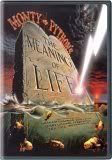
October 13, 2008
The Meaning of Life (1983)
Should I see it?
Monty Python was all about unveiling and then punching up the absurd in humanity. Anything worth mocking was worth blowing way out of proportion to ludicrous levels. The comedic troupe seems intent on not only crossing the line of good taste but doing so as extravagantly as possible. There is plenty in this film to offend most people, but given that this is the whole point, actually getting offended is pointless.
As the title suggests, they aim their sights on a broad array of subjects from contraception to war to gluttony. Unencumbered by the restrictions of television they let in a myriad of offensive material that clearly was unneeded and gives some of the humor a cheap feel. Having hundreds of children sing a mockery of the Catholic's opinions on birth control in one scene and having a celestial vagina widen and birth the universe in another are clear signs of a production not concerned with restraint. For all of the excesses, and there are plenty, there are some masterful pieces of comedy. The problem with the film is that it is so uneven. For every Mr. Creosote or guests bickering with the Grim Reaper you have to suffer through octogenarian corporate pirates and flat gags about tiger suits. The final scenes of the film are completely wasteful and nearly unwatchable. Their vision of the afterlife and Heaven feels tagged on and undeveloped and brings the movie to an unsatisfying close. This film is much like their classic television show half funny - half not, but the bits that do work are nothing less than brilliant. Keep the fast forward button handy while watching.
Cautions: This is Monty Python's at their most uncontrolled. If you have any issue with crass language, offensive behavior, nudity or violence you're advised to steer clear.
Worldview: The title of the film finds resolution by the admission that the meaning of life is that there isn't any meaning at all. This is suggested by a waiter Gaston "You see that house? That is where I was born. My mother said to me, "Garcon. The world is a beautiful place, and you must spread joy and contentment everywhere you go". And so I became a waiter... Well, I know it is not a great philosophy but..." then, feeling insecure in his admission he spits invective at the audience and tells them "I can live my life in my own way if I want to." In the end it's all about individual perspective and desire for comfort. Fair enough, but the troupe also goes out their way to mock religious belief while also claiming that since we're insignificant when put up against the broad expanse of the universe. If it's all so meaningless and without order than where do they get off mocking anything? The act of mockery suggests that the target of the humor is acting foolishly but such judgments can't exist in a meaningless universe. There's always that old retort that you can't say the universe with without truth because then even the charge that there's no truth can't be true and your argument collapses under its own weight. The fact that these guy's jokes are funny shows that they and their audience hold some truths to be evident. Where's there's truth - there's humor and vice-versa. The viewpoint they're pushing is like reading Ecclesiastes and forgetting the rest of the Bible. There is a meaning to life but despite their sarcasm and clever thinking, these ain't the guys to express it.
Related Reviews:
Terry Gilliam movies
Brazil (1985)
The Brothers Grimm (2005)
Other Critic's Reviews:
Roger Ebert
Independent Critics
Labels: comedy, Eric Idle, film, John Cleese, Monty Python, movie review, Terry Gilliam, Terry Jones
Share
Previous Posts




Good News Film Reviews LLC 2004-2010 - used with permission
Images, video and titles are the property of their respective copyright holders. Good News Film Reviews LLC claims no ownership or connection to them.
The views expressed on this site are not the opinion of any advertiser or external entity.
While we take care to only link to responsible entities, Good News Film Reviews LLC takes no responsibility for the content linked from this site. There are sharks in the waters. Surf at your own risk.
The Template is generated via PsycHo and is Licensed.






















0 Comments:
Post a Comment
<< Home